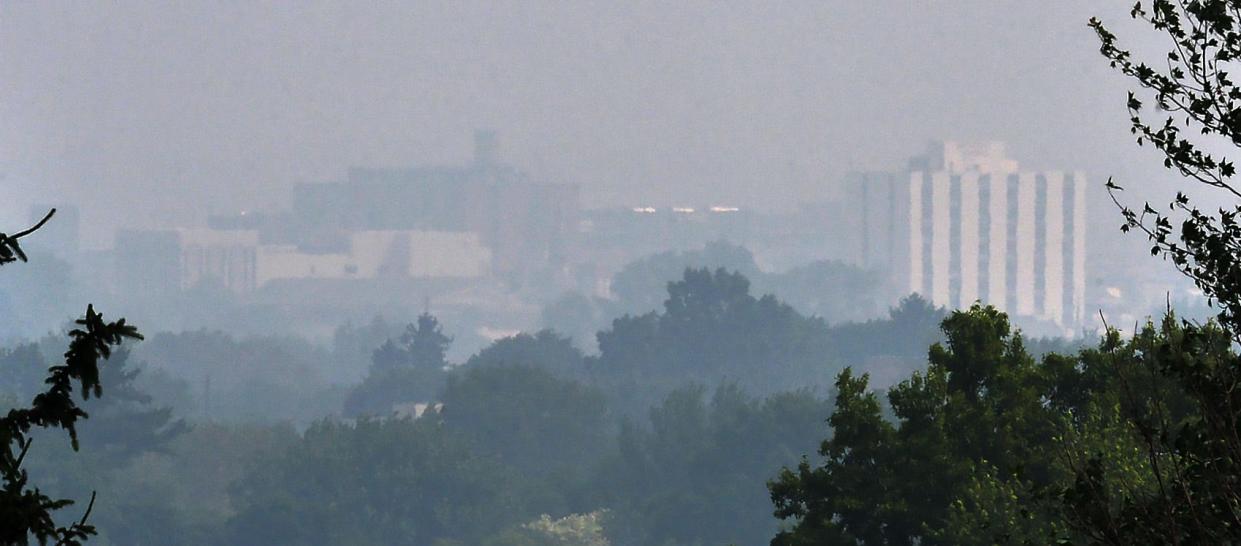No more free pass - make big polluters pay for damage caused by climate change
In his recent State of the Union speech, President Biden highlighted how his climate policies are helping Americans by bringing record investment and jobs to the U.S.
The positive economic impacts of investments in clean energy — a reported $240 billion in clean energy funding and 170,000 jobs from the Inflation Reduction Act alone — are welcome news at a time when the consequences of a warming planet continue to be felt all over the globe.
With scientists confirming last year was the hottest year on record, the president also spoke of the urgency of "confronting the climate crisis, not denying it."
In western Pennsylvania, the magnitude of global climate change came home to us last summer when smoke from Canadian wildfires, hundreds of miles away, filled the air we were breathing.

Elsewhere, Americans have endured alarming weather and climate extremes including wildfires and drifting toxic smoke, droughts, flooding, storms, and record precipitation. An issue of this scale is undeniably affecting the state of our union, so it warrants attention in the president's national address.
The issue isn't just a domestic one, of course. Climate change is getting worse because of the ongoing actions of big polluters, many of which are countries the U.S. conducts trade with. They're pumping Earth's atmosphere full of carbon pollution, leading to a warmer world and more extreme weather.
As individuals, we sometimes have no choice but to drive a gas car to work or heat our homes with fossil fuels so our families are warm during winter. We can do our best to make climate-friendly choices, transitioning to clean energy and taking responsibility for reducing our individual carbon footprints. But the carbon footprints of the world's biggest polluters dwarf our own, and they must be held accountable. In short: Polluters should pay.
It's a simple idea — and most Americans already support it. A recent poll revealed that 76% of Americans think large polluters should pay for the destructive emissions that overheat the planet and tarnish our air. According to the 2023 Yale Climate Opinion Maps, 60% of people right here in the 16th Congressional District support taxing fossil fuel companies. The same idea should hold true for our trading partners on the international stage.
And of course, America should do everything possible to reduce our country's own carbon pollution. We're heading in the right direction — U.S. emissions declined 1.9% in 2023 (Rhodium Group), and our economy produces fewer emissions during manufacturing than similar industries overseas. Yet foreign polluters with lower environmental standards can undercut American manufacturers without penalty.
Increasingly, countries are moving to hold polluters accountable, often through trade. With 30% of global emissions presently generated by the production and transport of exported and imported goods, it's a great place to start.
The E.U. and the U.K. have begun the process of imposing a carbon border adjustment mechanism (CBAM) to collect a fee at the border from high-polluting countries that undercut their domestic manufacturers with cheaper, carbon-heavy products.
This policy idea has bipartisan appeal in the U.S., too, since 75% of U.S. imports come from countries that produce more carbon pollution than the products we make here at home. In November 2023, Republican Senators Cassidy and Graham introduced the Foreign Pollution Fee Act. Just weeks later, Democrats in the House and Senate reintroduced the Clean Competition Act.
Both bills propose a fee on key materials such as aluminum, cement, iron and steel, and fossil fuels based on their carbon pollution. These policies would level the playing field by charging dirty importers for the difference between their high-emission products and our cleaner, domestic goods — and incentivize other countries to do better.
They also include measures intended to exempt developing nations from some or all of the carbon price to avoid damaging the economies of poorer countries that are not responsible for most of the world's carbon pollution.
It's clear with a little compromise, legislators can introduce bipartisan CBAM policy that appeals to both sides of the aisle. And they should because when big polluters get a free pass to harm the planet, they cost our communities dearly. It's time for our nation to ensure they pay a price.
Hopefully, the president sees this policy approach as the opportunity it is to meet his State of the Union promises and strive for more ambitious climate action.
Bruce Cooper is the group leader of the Slippery Rock chapter of Citizens' Climate Lobby. Mark Reynolds is the executive director of the Citizens' Climate Lobby.
This article originally appeared on Erie Times-News: Bipartisan legislation could make polluters pay for climate change
